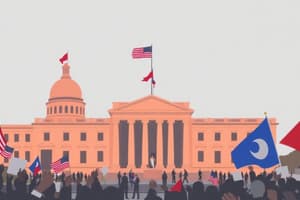Podcast
Questions and Answers
What is the primary characteristic that differentiates democracy from authoritarianism?
What is the primary characteristic that differentiates democracy from authoritarianism?
- Citizen participation in decision-making (correct)
- The absence of public opinion
- The presence of a single ruling party
- Limited freedom of speech
Which of the following best describes the role of elections in a democracy?
Which of the following best describes the role of elections in a democracy?
- Elections serve to maintain political stability through limited competition.
- Elections provide a mechanism for citizens to express their political preferences. (correct)
- Elections are primarily for selecting representatives from a single ideology.
- Elections primarily function to legitimize the governing party's authority.
In a democratic government, what is the significance of the separation of powers?
In a democratic government, what is the significance of the separation of powers?
- It ensures that laws are enacted without public scrutiny.
- It allows for unrestrained executive authority.
- It prevents the concentration of power in one branch of government. (correct)
- It simplifies the legislative process for efficiency.
Which statement about civil rights in a democracy is most accurate?
Which statement about civil rights in a democracy is most accurate?
What is a significant risk to democracies that can arise from populist movements?
What is a significant risk to democracies that can arise from populist movements?
Flashcards
Democracy Definition
Democracy Definition
A system of government where supreme power is vested in the people and exercised by them directly or indirectly through a system of representation, typically involving periodic free elections.
Popular Sovereignty
Popular Sovereignty
The principle that the people are the ultimate source of political power in a democracy.
Rule of Law
Rule of Law
The principle that everyone, including the government, is subject to and accountable under the law.
Free Elections
Free Elections
Signup and view all the flashcards
Citizen Rights
Citizen Rights
Signup and view all the flashcards
Political Participation
Political Participation
Signup and view all the flashcards
Study Notes
Defining Democracy
- Democracy is a system of government where supreme power is vested in the people and exercised by them directly or indirectly through a system of representation, typically involving periodic free and fair elections.
- Key features include citizen participation, protection of individual rights, and the rule of law.
- Different types of democracies exist, including direct democracies (where citizens directly vote on laws and policies) and representative democracies (where citizens elect representatives to make decisions on their behalf).
Principles of Democracy
- Popular Sovereignty: The principle that the ultimate source of political power lies with the people.
- Individual Rights: Guaranteeing fundamental rights and freedoms to all citizens, such as freedom of speech, religion, and assembly.
- Majority Rule with Minority Rights: Decisions are made by a majority vote, but the rights and interests of minorities are protected.
- Rule of Law: Ensuring that everyone, including government officials, is subject to and accountable under the law.
- Separation of Powers: Dividing governmental power among different branches (e.g., legislative, executive, judicial) to prevent tyranny.
- Checks and Balances: Mechanisms that allow each branch of government to limit the power of the other branches, maintaining a balance.
- Accountability: Government officials are responsible for their actions and decisions.
- Transparency: Government operations and decisions should be open to public scrutiny and discussion.
Challenges to Democracy
- Political Polarization: The development of distinct and opposing political viewpoints within a country. This can hamper consensus-building and effective governance.
- Corruption: Abuse of public office for personal gain, undermining public trust and democratic institutions.
- Inequality: Unequal distribution of resources and opportunities can limit equal participation and representation in democratic processes.
- Extremism: The rise of extremist ideologies can threaten democratic norms and institutions through violence, intolerance, or authoritarian means.
- Disinformation and Misinformation: The spread of false or misleading information online and in traditional media can manipulate public opinion and erode trust in democratic processes.
- Voter Apathy: Lack of interest in participating in electoral processes can lead to low turnout, resulting in a less representative government.
- Geopolitical Influences: External pressures and interventions from other countries can create instability and threaten democratic processes.
- Economic Inequality: Disparities in wealth and income can create social divisions and undermine trust in democratic institutions.
- Lack of Political Education: Insufficient knowledge about democratic processes and values can hinder citizen participation and understanding.
Different Forms of Democracy
- Direct Democracy: Citizens directly participate in the decision-making process. This model is commonly used in smaller political units like town councils.
- Representative Democracy: Citizens elect representatives to make decisions on their behalf. Most large-scale democratic societies operate using this model.
- Constitutional Democracy: A representative democracy where a constitution establishes and limits the powers of the government, protecting fundamental rights.
- Parliamentary Democracy: The executive branch (the Prime Minister) is drawn from the legislature (parliament). The Prime Minister is accountable to parliament.
- Presidential Democracy: The executive branch (the President) is elected separately from the legislature. The President is not directly accountable to the legislature.
Key Considerations
- Democratic institutions: Include free and fair elections, an independent judiciary, freedom of the press, and an active civil society.
- Civic Engagement: Active participation is essential for a healthy democracy—including voting, engaging in political discourse, and supporting democratic principles.
- Economic Factors: Economic well-being, or lack, can influence political participation and create social instability threatening democratic values.
- Social Factors: Factors such as religious beliefs, social identities and cultural norms can shape the political landscape and influence political participation.
- Historical Context: Historical and political events have dramatically shaped the development of democracy in various countries and regions.
Studying That Suits You
Use AI to generate personalized quizzes and flashcards to suit your learning preferences.




